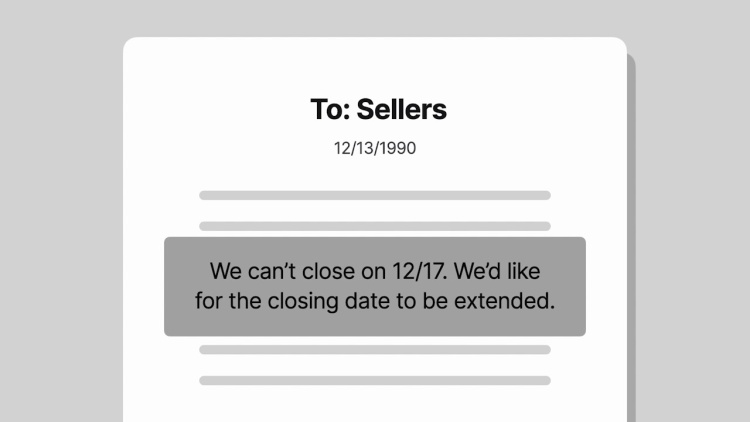Wallace Real Estate Investment, Inc. v. Groves
Washington Supreme Court
881 P.2d 1010 (1994)
- Written by Lauren Petersen, JD
Facts
Joanna Groves, Charles Siler, and James Siler (the sellers) (defendants) entered into a contract to sell a property to Roddy Cox for $1,520,000. The contract required $20,000 in earnest money. It also provided a 30-day window for a feasibility study, after which Cox could decide whether to move forward with the sale. If Cox decided to buy the property, closing would take place within 60 to 90 days. Additionally, the contract allowed Cox to extend the closing date by 30 days by paying a nonrefundable sum of $15,000, with the possibility of extending up to 12 times. In the event of breach, the contract permitted the sellers to keep the earnest money and all other payments from Cox. Cox paid the earnest money and then assigned his rights to Wallace Real Estate Investment, Inc. (Wallace) (plaintiff). Wallace extended all 12 times permitted under the contract, then negotiated a final two-month extension and designated a closing date of December 17, 1990. On December 13, Wallace wrote to the sellers that it could not close on December 17. Wallace requested a new closing date of on or around January 7, 1991. The sellers refused to extend the closing date. On December 17, Groves and Charles Siler went to the closing. They mailed the deed and closing papers to James Siler, whose back problems kept him from attending. James Siler signed the documents and returned them to Groves, who in turn delivered them to escrow on December 21, four days after the contractual closing date. The sellers also cancelled the contract of sale on December 21. The sellers kept the $260,000 that they received in earnest money and extension payments as liquidated damages. Wallace sued the sellers for breach of contract, claiming that the sellers failed to deliver the deed on December 17. Wallace argued that this failure constituted a breach that obligated the sellers to return the $260,000. The trial court held that Wallace’s December 13 letter constituted an anticipatory breach, which excused the sellers’ performance under the contract. Wallace appealed, and the court of appeals affirmed. Wallace appealed.
Rule of Law
Issue
Holding and Reasoning (Madsen, J.)
What to do next…
Here's why 911,000 law students have relied on our case briefs:
- Written by law professors and practitioners, not other law students. 47,100 briefs, keyed to 997 casebooks. Top-notch customer support.
- The right amount of information, includes the facts, issues, rule of law, holding and reasoning, and any concurrences and dissents.
- Access in your classes, works on your mobile and tablet. Massive library of related video lessons and high quality multiple-choice questions.
- Easy to use, uniform format for every case brief. Written in plain English, not in legalese. Our briefs summarize and simplify; they don’t just repeat the court’s language.





